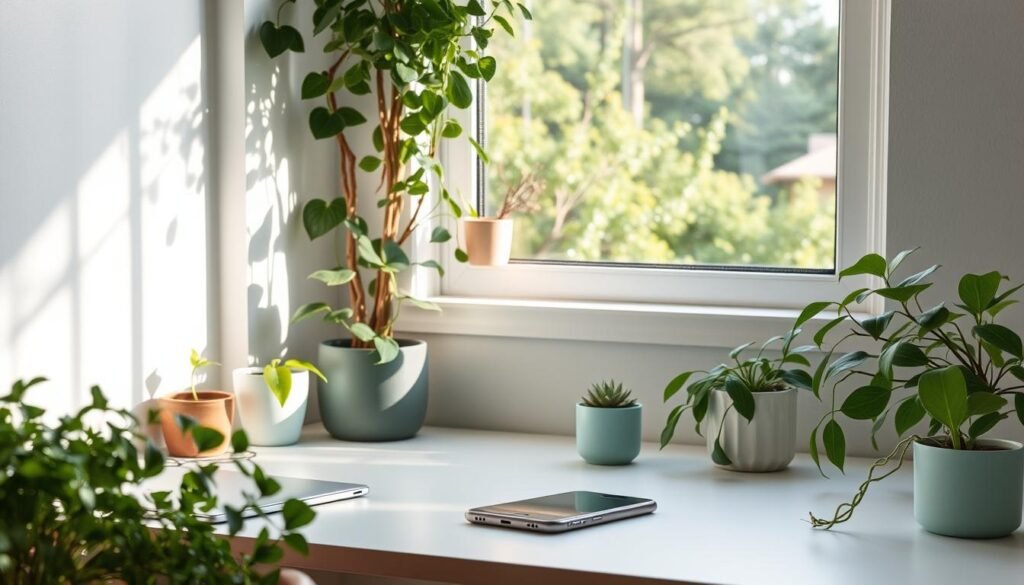Feeling overwhelmed in today’s fast world? You’re not alone. Keeping your mental health up can seem like a daily fight. Yet, your emotional health is as important as your physical health.
A study in the Journal of the American Psychosomatic Society found stress is as bad as smoking. The good news is, you can improve your mental health with simple steps. These seven mental health hacks will help you manage stress and emotions better. They’ll help you live a happier, more fulfilling life, starting now.
Key Takeaways
- Prioritizing your mental health is crucial for overall well-being and happiness.
- Simple, evidence-based techniques can significantly boost your mental well-being.
- Incorporating self-care strategies into your daily routine can lead to lasting positive change.
- Investing in your emotional well-being can have far-reaching benefits for your physical health.
- These seven mental health hacks are easy to implement and can make a tangible difference in your life.
Understanding the Impact of Mental Health on Overall Well-being
Your mental health and physical health are closely linked. What affects your mind can harm your body, and vice versa. Taking care of your mental health is key to staying healthy and happy.
The Science Behind Mental and Physical Health Connection
Poor mental health can lead to physical problems like heart disease and weakened immune systems. On the other hand, physical issues can make you feel stressed, anxious, and depressed. For instance, coffee can help lower depression rates, and dark chocolate boosts alertness and mental skills.
How Stress Affects Your Daily Life
Stress can upset the balance between your mental and physical health. Being around animals can lower stress and make you happier. Chronic stress can harm your daily life as much as smoking. Using stress management techniques, like mindfulness, can help you handle daily challenges.
The Benefits of Prioritizing Mental Health
Putting your mental health first can greatly improve your well-being. Writing down things you’re grateful for can make you happier, and forgiving can lead to better mental health and life satisfaction. Also, spending time with loved ones can make you 12 times more likely to feel happy.

Investing in your mental health is crucial for a better life. Recognizing the strong link between your mental and physical health is the first step to improving both.
Creating a Daily Relaxation Routine for Better Mental Health
Adding relaxation techniques to your daily life can change how you handle stress. You can try meditation, deep breathing, or other methods to see what works for you.
Morning meditation for 10 minutes can sharpen your focus. Planning your tasks the night before can cut down on morning stress. Exercise also boosts brain health and helps with memory.
The Pomodoro Technique is great for staying focused. It involves working for 25 minutes, then taking a 5-minute break. Omega-3 fatty acids in foods like salmon also support brain health.
Getting 7-9 hours of sleep each night is key to your health. Drinking plenty of water and eating whole foods can also improve your mood.
Creating a daily relaxation routine is personal. Try different techniques to find what works for you. By doing so, you can lead a healthier, more balanced life.

“The greatest weapon against stress is our ability to choose one thought over another.” – William James
The Power of Gratitude and Positive Thinking
Gratitude and positive thinking can change your mental health for the better. Being optimistic and thankful can make you live longer and feel happier. It also helps you handle stress better and live a healthier life.
Practical Ways to Practice Daily Gratitude
Adding gratitude to your daily routine can greatly improve your mood. Simple actions like keeping a gratitude journal or thanking loved ones can help. Research shows these practices can make you feel more grateful, happier, and less anxious.
Journaling Techniques for Emotional Well-being
Journaling is a great way to deal with mental health issues and express your feelings. A 2018 study found that 15 minutes of journaling each day can lower stress and anxiety. Try different journaling styles, like free-writing or adding art, to release your thoughts and grow emotionally.
Building a Positive Mindset Through Self-reflection
Creating a positive mindset takes self-reflection and challenging negative thoughts. Watch out for negative self-talk and replace it with positive affirmations. Over time, you can change your inner dialogue and become more optimistic.

“The greatest weapon against stress is our ability to choose one thought over another.” – William James
Leveraging Social Connections for Emotional Support
Strong social connections are key for your mental health. Regular social interaction can reduce loneliness and offer support. Sharing time with friends and family or staying in touch through messages and calls is important. It greatly impacts your happiness and fulfillment.
It’s also vital to set boundaries and avoid overdoing it. Finding the right balance between socializing and personal time is crucial. This helps keep relationships healthy and prevents burnout. It’s the quality of relationships, not the quantity, that leads to happiness and health.
- Prioritize quality time with your loved ones to strengthen emotional bonds.
- Engage in regular communication, even through virtual means, to stay connected.
- Set boundaries to maintain a healthy work-life balance and prevent emotional exhaustion.
- Seek out opportunities to expand your social circle and build new meaningful connections.
- Practice empathy, respect, and genuine concern for others’ well-being to nurture strong relationships.
By using your social connections and building a strong support network, you can improve your emotional well-being. Remember, your relationships are a vital part of your mental health journey.

“The greatest weapon against stress is our ability to choose one thought over another.” – William James
7 Essential Hacks for Enhancing Your Mental Health
Mindfulness and Meditation Practices
In today’s fast world, finding time for mindfulness and meditation is key. These practices help you find calm and boost your mood. Mindfulness, like deep breathing, can lower stress and bring peace.
Just a few minutes of meditation each day can greatly improve your mental health.
Physical Exercise and Mental Wellness
Regular exercise is a strong tool for better mental health. It can reduce anxiety and boost confidence. Activities like yoga or swimming release happy hormones and help manage stress.
Making exercise a part of your routine can change your mental health for the better.
Sleep Optimization Strategies
Sleep is vital for mental health. Lack of sleep makes it hard to handle emotions and stress. To sleep better, keep a regular sleep schedule and a cool bedroom.
Avoid screens before bed and have a calming bedtime routine. This can improve your sleep and mental health.
| Mindfulness Techniques | Exercise for Mental Health | Sleep Optimization Tips |
|---|---|---|
|
|
|

“Taking care of your mind is just as important as taking care of your body. Incorporating mindfulness, exercise, and sleep optimization into your daily routine can have a profound impact on your overall mental health and well-being.”
Managing Digital Wellness and Social Media Impact
In today’s world, it’s key to balance our online and offline lives for our mental health. Too much social media can make anxiety and depression worse. People spend about 2.5 hours daily on these platforms.
A big 59% of adults say social media hurts their mental health. It can cause FOMO (fear of missing out), burnout, and stress.
To fight social media’s bad effects, we need healthy online habits. Don’t start or end your day with social media. It can mess up your sleep.
Instead, limit your social media time. Use that extra time for fun, relaxation, or quality time with family and friends.
- Be mindful of your digital consumption and take regular breaks from screens to avoid mental burnout.
- Curate your social media feeds by unfollowing accounts that evoke negative emotions and following those that promote positivity and well-being.
- Designate “no phone zones” in your home or workspace to create a digital-free environment and encourage deeper connections with the physical world.
By focusing on digital wellness and a healthy social media relationship, you can boost your mental health. It’s about finding a balance that fits your life.
| Statistic | Percentage |
|---|---|
| Average social media usage per day | 2.5 hours |
| Adults who report social media impacting their mental health | 59% |
| Individuals who report feeling FOMO (fear of missing out) | 37% |

“To address negative feelings induced by social media content, it is advisable to clean up feeds by unfollowing accounts that evoke negative emotions and following accounts that promote positivity and well-being.”
Incorporating Creative Expression for Mental Health
Unlocking your creative side can greatly improve your mental health. Activities like trying new recipes, writing, painting, or DIY projects can deeply impact your well-being. They help build emotional strength and mental health.
Art Therapy and Emotional Release
Art therapy uses creativity to help people deal with emotions and trauma. It’s proven to lessen anxiety and depression symptoms. It also boosts self-confidence and overall happiness.
Training from places like IPHM, CMA, and the Centre of CPD Excellence teaches art therapy skills. Using art to express emotions helps manage stress and anxiety better.
Music and Movement for Mood Enhancement
Music and movement can also boost your mental health. Dancing or listening to upbeat music lowers stress and boosts happiness. Even coloring for 20 minutes can calm the mind and reduce anxiety.
Being creative gives you a focus that distracts from negative thoughts. It helps relieve stress and improves your overall well-being. So, let your creativity shine and see how it transforms your mental health.
“Creativity is the greatest expression of our humanity.” – Brené Brown
Building Healthy Lifestyle Habits for Long-term Well-being
It’s key to build healthy habits for your mental health. These include eating well, exercising, sleeping well, and taking care of yourself. These habits help you stay strong mentally and improve your life quality.
Nourish Your Mind and Body
Eating right is important for your mind. Eat foods like fatty fish, berries, beans, and whole grains. They help your brain and mood. Also, drink lots of water to keep your mind sharp and emotions stable.
Embrace Physical Activity
Exercise is great for your mind. It lowers stress, helps you sleep better, and makes you feel happier. Find activities you like, like walking, yoga, or swimming. This helps with anxiety and depression.
Prioritize Quality Sleep
Good sleep is vital for your mind. Aim for 7-9 hours each night. Sleeping less than 6 hours can lead to mental issues. Stick to a sleep schedule, avoid screens before bed, and make your bedroom calm.
Cultivate Mindfulness and Relaxation
Mindfulness, like meditation, helps with stress and emotions. Also, do things you enjoy, like being in nature or trying new things. This boosts your mood and energy.
By following these habits, you build a strong base for mental health. Small steps can make a big difference in your health and happiness.
| Habit | Benefits for Mental Health |
|---|---|
| Balanced Diet | Supports brain function, mood regulation, and overall well-being |
| Regular Exercise | Reduces stress, improves sleep, and enhances mood |
| Quality Sleep | Promotes cognitive function, emotional stability, and stress management |
| Mindfulness Practices | Helps manage stress, improve emotional regulation, and foster inner calm |
“Healthy habits are the foundation of a healthy life. By nourishing our minds and bodies, we can unlock our full potential and thrive.”
Conclusion: Sustaining Your Mental Health Journey
Improving your mental health is a journey that never ends. It needs constant effort and looking inward. By using the tips from this article, you can make big steps towards better well-being. Remember, your mental health is about your feelings, thoughts, and how you connect with others.
To keep your mental health strong, keep changing these strategies to fit your life. It’s okay to ask for help sometimes. Mental health experts can offer great advice and tools to help you stay on track.
Keep growing and learning as you go on your mental health journey. Be proud of your wins, learn from your losses, and be kind to yourself. By focusing on your mental health, you can live a stronger and more rewarding life, now and in the future.



